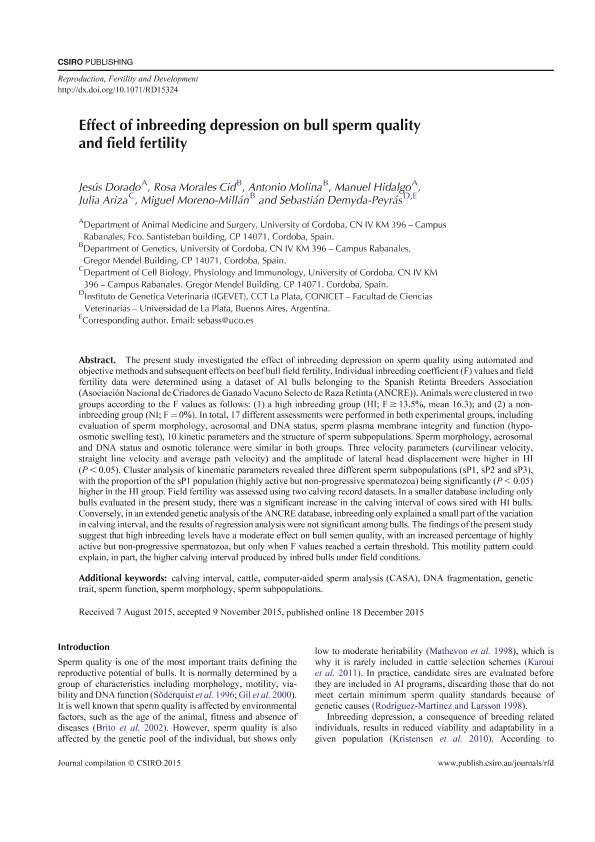Mostrar el registro sencillo del ítem
dc.contributor.author
Dorado, Jesús
dc.contributor.author
Morales Cid, Rosa
dc.contributor.author
Molina, Antonio
dc.contributor.author
Hidalgo, Manuel
dc.contributor.author
Ariza, Julia
dc.contributor.author
Moreno Millán, Miguel

dc.contributor.author
Demyda-peyrás, Sebastian

dc.date.available
2018-06-11T19:00:52Z
dc.date.issued
2017-03
dc.identifier.citation
Dorado, Jesús; Morales Cid, Rosa; Molina, Antonio; Hidalgo, Manuel; Ariza, Julia; et al.; Effect of inbreeding depression on bull sperm quality and field fertility; Csiro Publishing; Reproduction Fertility and Development; 29; 4; 3-2017; 712-720
dc.identifier.issn
1031-3613
dc.identifier.uri
http://hdl.handle.net/11336/48139
dc.description.abstract
The present study investigated the effect of inbreeding depression on sperm quality using automated and objective methods and subsequent effects on beef bull field fertility. Individual inbreeding coefficient (F) values and field fertility data were determined using a dataset of AI bulls belonging to the Spanish Retinta Breeders Association (Asociación Nacional de Criadores de Ganado Vacuno Selecto de Raza Retinta (ANCRE)). Animals were clustered in two groups according to the F values as follows: (1) a high inbreeding group (HI; F≥13.5%, mean 16.3); and (2) a non-inbreeding group (NI; F≤0%). In total, 17 different assessments were performed in both experimental groups, including evaluation of sperm morphology, acrosomal and DNA status, sperm plasma membrane integrity and function (hypo-osmotic swelling test), 10 kinetic parameters and the structure of sperm subpopulations. Sperm morphology, acrosomal and DNA status and osmotic tolerance were similar in both groups. Three velocity parameters (curvilinear velocity, straight line velocity and average path velocity) and the amplitude of lateral head displacement were higher in HI (P<0.05). Cluster analysis of kinematic parameters revealed three different sperm subpopulations (sP1, sP2 and sP3), with the proportion of the sP1 population (highly active but non-progressive spermatozoa) being significantly (P<0.05) higher in the HI group. Field fertility was assessed using two calving record datasets. In a smaller database including only bulls evaluated in the present study, there was a significant increase in the calving interval of cows sired with HI bulls. Conversely, in an extended genetic analysis of the ANCRE database, inbreeding only explained a small part of the variation in calving interval, and the results of regression analysis were not significant among bulls. The findings of the present study suggest that high inbreeding levels have a moderate effect on bull semen quality, with an increased percentage of highly active but non-progressive spermatozoa, but only when F values reached a certain threshold. This motility pattern could explain, in part, the higher calving interval produced by inbred bulls under field conditions.
dc.format
application/pdf
dc.language.iso
eng
dc.publisher
Csiro Publishing

dc.rights
info:eu-repo/semantics/openAccess
dc.rights.uri
https://creativecommons.org/licenses/by-nc-sa/2.5/ar/
dc.subject
Calving Interval
dc.subject
Cattle
dc.subject
Computer-Aided Sperm Analysis (Casa)
dc.subject
Dna Fragmentation
dc.subject
Genetic Trait
dc.subject
Sperm Function
dc.subject
Sperm Morphology
dc.subject
Sperm Subpopulations.
dc.subject.classification
Otras Biotecnología Agropecuaria

dc.subject.classification
Biotecnología Agropecuaria

dc.subject.classification
CIENCIAS AGRÍCOLAS

dc.title
Effect of inbreeding depression on bull sperm quality and field fertility
dc.type
info:eu-repo/semantics/article
dc.type
info:ar-repo/semantics/artículo
dc.type
info:eu-repo/semantics/publishedVersion
dc.date.updated
2018-06-11T14:31:25Z
dc.journal.volume
29
dc.journal.number
4
dc.journal.pagination
712-720
dc.journal.pais
Australia

dc.journal.ciudad
Collingwood
dc.description.fil
Fil: Dorado, Jesús. Universidad de Córdoba; España
dc.description.fil
Fil: Morales Cid, Rosa. Universidad de Córdoba; España
dc.description.fil
Fil: Molina, Antonio. Universidad de Córdoba; España
dc.description.fil
Fil: Hidalgo, Manuel. Universidad de Córdoba; España
dc.description.fil
Fil: Ariza, Julia. Universidad de Córdoba; España
dc.description.fil
Fil: Moreno Millán, Miguel. Universidad de Córdoba; España
dc.description.fil
Fil: Demyda-peyrás, Sebastian. Consejo Nacional de Investigaciones Científicas y Técnicas. Centro Científico Tecnológico CONICET- La Plata. Instituto de Genética Veterinaria "Ing. Fernando Noel Dulout". Universidad Nacional de La Plata. Facultad de Ciencias Veterinarias. Instituto de Genética Veterinaria; Argentina
dc.journal.title
Reproduction Fertility and Development

dc.relation.alternativeid
info:eu-repo/semantics/altIdentifier/doi/http://dx.doi.org/10.1071/RD15324
dc.relation.alternativeid
info:eu-repo/semantics/altIdentifier/url/http://www.publish.csiro.au/rd/RD15324
Archivos asociados
